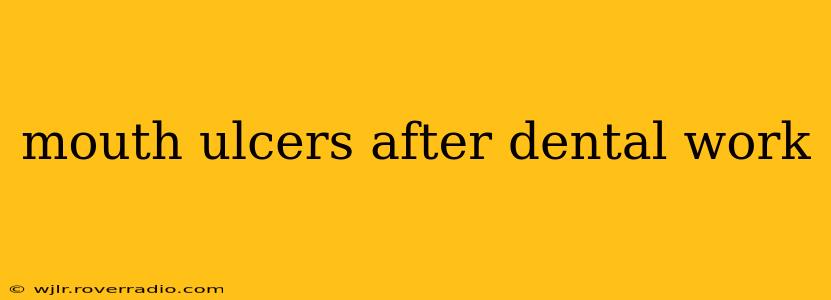Mouth ulcers, also known as aphthous ulcers or canker sores, are small, painful sores that can develop inside the mouth. While they can occur spontaneously, it's not uncommon to experience them after dental work. This can be a frustrating experience, leaving you with discomfort and impacting your ability to eat and speak comfortably. This comprehensive guide will explore the causes of mouth ulcers after dental work, effective treatment options, and preventative measures to minimize your risk.
What Causes Mouth Ulcers After Dental Work?
Several factors can contribute to the development of mouth ulcers following dental procedures. These include:
-
Trauma to the mouth: Dental procedures, even minor ones like cleanings or fillings, can cause minor trauma to the soft tissues of the mouth. This irritation can trigger an inflammatory response, leading to ulcer formation. The scraping of instruments, the injection of anesthetic, or even the placement of a temporary crown can all contribute.
-
Infection: While less common, an infection resulting from the procedure can also cause mouth ulcers. This might be due to a bacterial or viral infection introduced during the procedure or a reaction to the materials used.
-
Allergic reaction: Some individuals may have an allergic reaction to materials used during dental work, such as certain metals or anesthetics. This allergic reaction can manifest as mouth ulcers.
-
Stress: The stress associated with undergoing dental procedures can also weaken the immune system, making individuals more susceptible to mouth ulcers.
-
Weakened immune system: Underlying health conditions or medications that suppress the immune system can increase the risk of developing mouth ulcers after dental work.
How Long Do Mouth Ulcers After Dental Work Last?
The duration of mouth ulcers after dental work varies depending on the underlying cause and the individual's healing process. Generally, they resolve within 7 to 10 days. However, larger or more severe ulcers may take longer to heal. If the ulcer persists for longer than two weeks or shows signs of worsening (increased size, pain, or bleeding), it's essential to consult a dentist or doctor.
How to Treat Mouth Ulcers After Dental Work?
Several at-home treatments can provide relief from the discomfort of mouth ulcers:
-
Over-the-counter pain relievers: Ibuprofen or acetaminophen can help manage pain and reduce inflammation.
-
Rinsing with salt water: A warm salt water rinse can help clean the ulcer and reduce inflammation. Dissolve ½ to 1 teaspoon of salt in 8 ounces of warm water and gently rinse several times a day.
-
Oral anesthetic gels: These gels contain ingredients like benzocaine or lidocaine to numb the area and provide temporary pain relief.
-
Applying honey: Honey has natural antibacterial and healing properties that can help promote healing and reduce discomfort.
-
Avoiding irritating foods: Avoid acidic, spicy, or hot foods and drinks that can exacerbate the pain and inflammation.
Are Mouth Ulcers After Dental Work Serious?
Most mouth ulcers following dental procedures are not serious and heal on their own within a week or two. However, persistent or worsening ulcers warrant professional evaluation. Signs that suggest you should seek medical attention include:
- Ulcers that last longer than two weeks
- Large or deep ulcers
- Ulcers that bleed easily
- Fever or other signs of infection
- Difficulty swallowing or breathing
Can I Prevent Mouth Ulcers After Dental Work?
While it’s impossible to guarantee prevention, several measures can reduce your risk:
-
Maintain good oral hygiene: Thorough brushing and flossing before and after the procedure can minimize the risk of infection.
-
Follow post-operative instructions carefully: Adhering to your dentist's instructions regarding pain medication, diet, and oral hygiene is crucial.
-
Manage stress levels: Practicing relaxation techniques, such as deep breathing or meditation, can help reduce stress and strengthen your immune system.
What if my mouth ulcer is still there after a week?
If a mouth ulcer persists for longer than a week after your dental procedure, it’s crucial to contact your dentist. Prolonged healing could indicate an underlying issue, such as an infection or an allergic reaction that requires further evaluation and treatment. Your dentist will be able to assess the situation and recommend the appropriate course of action.
Are there any specific foods to avoid after dental work to prevent mouth ulcers?
While you should always avoid extremely hot foods and drinks, spicy, acidic, and hard-to-chew foods can increase discomfort if you develop a mouth ulcer after dental work. Focusing on soft, bland foods during recovery will be the most comfortable.
This information is for general knowledge and informational purposes only, and does not constitute medical advice. It is essential to consult with a qualified healthcare professional for any health concerns or before making any decisions related to your health or treatment.
